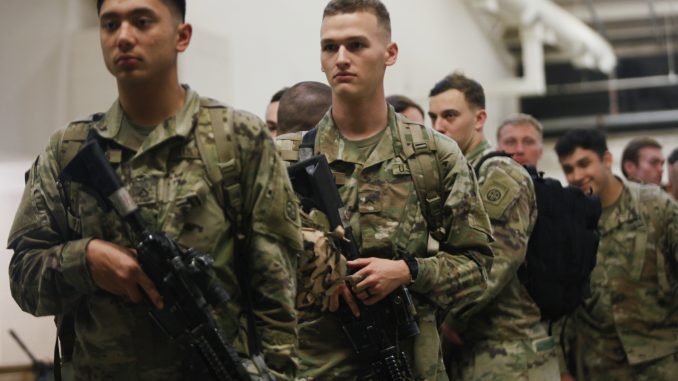
“To win one hundred victories in one hundred battles is not the acme of skill. To subdue the enemy without fighting is the acme of skill.” — Sun Tzu, Chinese military strategist, 544-496 B.C.
Clearly, we have not paid close enough attention in 2500 years. The problem is that Sun Tzu’s prescription is lost advice on misguided policy makers, pundits and military leaders who limit their security calculations to how to make our military “things” better than the prospective enemy’s military “things.” And shallow thinking in national security is more than a debating point; it is potentially catastrophic.
Our military has two essential tasks, and Sun Tzu’s counsel addresses the underappreciated second one.
The nearly universal current national approach to security is limited to the first task — winning the nation’s wars. “The acme of skill,” though, is in the second task — deterring conflict by creating near certainty in the minds of potential enemies that the United States would win. But do not jump to conclusions; the standard for calculating effective deterrence is not in what we think constitutes national combat power, but what the enemy thinks. Wars occur when a nation or force calculates that they stand a good chance of prevailing whether it is a valid judgment or not. Deterrence, then, occurs when a nation or force fears the power of the other. What is lost in the current discussion of our national security is that our nation’s foes are losing the conviction that the United States has the will and toughness to prevail in a conflict.
The prevailing method for assessing combat power is by technological standards. Not good enough. The adversaries who judge the military power of the United States respect our technology, but they also assess that “things” are not enough. In colloquial terms, “It’s not the size of the dog in the fight, but the size of the fight in the dog.” In military terms, another close observer of conflicts and strategy, Napoleon, said that in war, “The moral is to the physical as three is to one.” In this context, Napoleon’s counsel is that the greatest power is derived not from the physical domain of a force, but from its conviction, training and toughness. And that is where adversaries judge our terminal weakness.
Our adversaries observe how social engineering has become deeply embedded in our military, and they conclude that we are weak with feet built from clay. They lampoon and deride our silliness (and so do many of our troops). When enemies read of male soldiers wearing pregnancy suits and high heels, required “sensitivity” training, “Emma and her two moms” recruiting videos, “safe spaces” from the pressures of introductory training, the dilution of our ground combat forces, and transgender special treatment, they judge these actions not by our standards, but by their own.
These policies may play well in the salons on the U.S coasts, but they most decidedly do not impress the audiences in China, North Korea, Russia, or Iran. This was not the case even a dozen years ago, but the picture is different today, and the situation is worsening.
Our current image of softness has not always been so. Here are just two examples to illustrate:
“Panic sweeps my men when they face Marines.” — North Korean major from the Korean War.
“We will not fight them. They are not normal. When we shoot at them, they run towards us. If we fight them, we die. They are worse than the sons of Satan.” — Taliban radio intercept.
If you fail to see the value of these perceptions, you are part of the problem. The corridors of power and communication in our country have come to believe that what is appropriate and desirable in our civil society is also appropriate and desirable in our military.
H.L. Mencken said, “An idealist is one who, on noticing that roses smell better than cabbage, concludes that it will also make a better soup.” Perhaps this myopia is because such a miniscule percentage of our nation has served, but even current military leaders are accommodating measures that both weaken our image and deter the neo-Spartans among those who serve (or might).
Whatever the rationale for accommodation, such thinking is both flawed and deeply dangerous. Test case: Will China be more or less emboldened to seize Taiwan if they misjudge the strength and grit of our military? Further test case: Will Vladimir Putin conclude that our forces are not as tough as the Russian soldier, and will that assessment further allow him to expand on his seizure of the Crimea from 2014? And don’t forget our allies and those nations sitting on the fence. If they perceive U.S. weakness, are they more or less likely to align with our foreign policy objectives?
Former secretary of Defense Jim Mattis had it right. There should be only one measurable standard for our defense policies and priorities: Does the action make us more lethal or less lethal?
If the acme of skill is to subdue the enemy without fighting, what would the great Chinese strategist say of a country whose policies aid and abet challenge and confrontation? I suspect that he’d conclude we will pay a severe price for delusion. If so, Sun Tzu’s only error is that “we” won’t pay the price; those who will then be 18-20 years old will.
G.S. Newbold is a retired lieutenant general, US Marine Corps
Previously published in The Federalist



